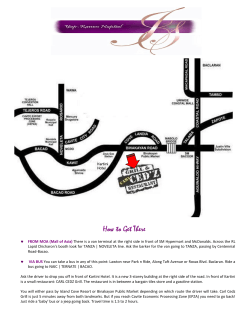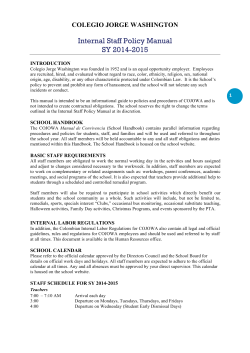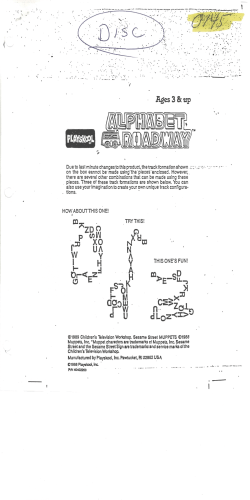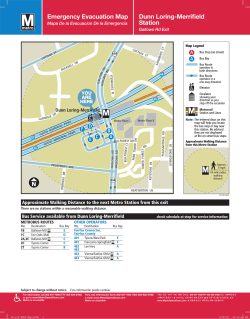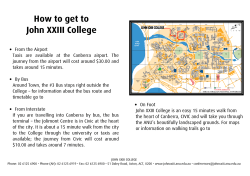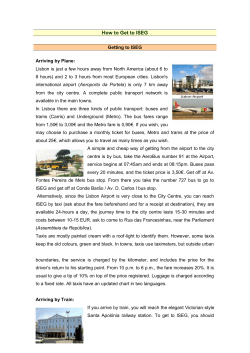
COLEGIO JORGE WASHINGTON Internal Staff Policy Manual SY 2013-2014
COLEGIO JORGE WASHINGTON Internal Staff Policy Manual SY 2013-2014 SCHOOL HANDBOOK The COJOWA Manual de Convivencia (School Handbook) contains much information regarding procedures and policies and will be used and referred to throughout the school year. All staff members will be held accountable to any and all staff obligations and duties mentioned within this Handbook. The School Handbook is housed on the school website. BASIC STAFF REQUIREMENTS All staff members are obligated to work the normal working day in the activities and hours assigned and adjust to changes considered necessary to the workweek. In addition, staff members are expected to work on complementary or related assignments such as: workshops, parent conferences, academic meetings, and social programs of the school. It is also expected that teachers provide additional help to students through a scheduled and controlled remedial program. Staff members will also be required to participate in school activities which directly benefit our students and the school community as a whole. Such activities will include, but not be limited to, remedials, sports, specials interest “Clubs,” occasional bus monitoring, occasional substitute teaching, Halloween activities, Family Day activities, Christmas Programs, and events sponsored by the PTA. INTERNAL LABOR REGULATIONS In addition, the Colombian Internal Labor Regulations for COJOWA also contain all legal and official guidelines, rules and regulations for COJOWA employees and should be used and referred to by staff at all times. This document is available in the Human Resources office. SCHOOL CALENDAR Please refer to the official calendar approved by the Directors Council and the School Board for details on official work days and holidays. All staff members are expected to adhere to the official calendar at all times. Any and all absences must be approved by your direct supervisor. This calendar is housed on the school website. STAFF SCHEDULE FOR SY 2012-2013 Teachers 7:00 – 7:10 AM 3:00 3:30 4:30 Arrival each day Departure on Mondays, Tuesdays, Thursdays, and Fridays Departure on Wednesdays (not Early Dismissal days) Departure on Wednesday Student Early Dismissal Days Administration 7:00 4:00 4:30 3:30 Arrival each day Departure Monday through Thursday Departure on Wednesday Student Early Dismissal Days Departure on Fridays COJOWA: Building our legacy together since 1952 1 STUDENT SUPERVISION All staff members at COJOWA are expected to provide student supervision at all times whether or not they are with their own students or are in a scheduled class. As professionals, we are all expected to look out for the well-being of our students while on the buses, while at school, in the halls, in the cafeteria, and while on school sponsored trips. Since Cartagena is a small city and you often run into students off campus, it is also expected that you report to your direct supervisor any inappropriate or illegal behavior that you might observe or witness from students while off campus. AFTERNOON STUDENT DISMISSAL PROCEDURES WHEN RAINING: When it is raining outside, please follow these Rainy Day Dismissal Procedures. At 2:35, or 1:00 on Early Dismissal days, please instruct your class to walk to the cafeteria. Elementary teachers may start taking their classes to the cafeteria at 2:30 (12:55 on Early Dismissal days) to arrive before the MS and HS students. ALL teachers should walk with their classes to the cafeteria to provide supervision and ensure safety. Inside the cafeteria, the tables will be marked with signs identifying the different bus route numbers. Students should find and stand by the table that corresponds to their bus route. Teachers should stand nearby the table that corresponds to their grade level (Grade 4 teachers should stand by the Route 4 table). Students who are on bus routes #1 and #2 should report directly to the main entrance drop off area, in front of the Flag patio and next to the administrative building, where Diana will be waiting. These children do not need to go to the cafeteria. Students will be called from the cafeteria one route at a time by a member of the Administration. Students should not leave the cafeteria until their bus route has been called. BUS TRANSPORTATION COJOWA provides bus transportation to all staff members from the city of Cartagena to the North Campus. This transportation is not necessarily door to door and might require that a staff member walk to a designated pickup area. The school cannot be held responsible for anything lost or damaged while on these routes. Characteristics of this service: The route takes between 45 minutes and an hour. The buses are air-conditioned. The air conditioning is not always consistent and can sometimes vary in temperature. Please be patient and understanding with this point. The buses are provided by an external company and may vary from time to time. The buses are not new buses and do not have luxurious, reclining chairs. The buses are checked regularly and are held to typical, local quality standards. BUS SUPERVISION Morning (AM) student routes are covered and supervised by COJOWA staff members based on first come, first serve volunteering. These duties are paid assignments and should be requested from Diana Puente in the transportation office. Starting in 2012, COJOWA hired external bus monitors from our neighboring sister community, Manzanillo del Mar, to work as bus monitors in 10 of the afternoon (PM) student COJOWA: Building our legacy together since 1952 2 routes. Due to the fact that the school has 14 student routes in total, it is necessary to ask staff members to assume the duties of the remaining 4 routes in the afternoon. Since this duty is a paid duty, first priority will go to staff members who have provided this service in the past and who volunteer to perform this duty. If it turns out that there are left over routes in the afternoon to supervise after staff have been given a chance to volunteer for these paid duties, the remaining routes will be randomly assigned to all Zona Norte staff members throughout the year. In the case this happens, staff members should be sure to reserve these dates in their personal calendars to make sure to be able to provide this important supervision. No exceptions will be made on these assignments and all staff members are expected to perform these random and occasional duties without hesitation. The school understands that staff members cannot be held responsible for any accidents that might happen while providing supervision on these buses; nor will the school hold the staff member accountable for any student material object that is lost, stolen or damaged while on the routes. If, of course, it is determined that staff negligence was the cause of an accident, loss, theft, etc., then staff members will have to respond to the situation and could be held accountable. School Bus Rules for Monitors Look after the assigned bus route from start till end and oversee the students’ discipline. Be vigilant over any eventuality that may happen, and communicate with the Transportation Coordinator. (Diana Puente, cell#: 320-569-5330) Be watchful over students’ safety. Make sure that ALL students are picked-up and dropped-off at their designated location. Check the bus and make sure no objects are left behind after the bus route is over. Safe-keep any object you’ve found left behind in the bus and hand it over to its owner or the Transportation Coordinator. Give directions to the Bus Driver if he is substituting the regular driver. Communicate to students any changes you are planning to make to the bus route. Make sure students follow the bus rules. Follow any additional task that may be given out by the Transportation Coordinator (e.g. a variation of the bus route…) Make sure your cell phone is turned on at all times during the bus route to have direct communication with the school. In case of serious accident/injury, communicate immediately with the Transportation Coordinator and follow the given instructions. Verify that all students are dropped-off in their respective bus stop, in front of their residence, without a need to cross the street. If the student wishes to be dropped off at a different bus stop he/she must show a permission in written form signed by his/her parents and approved by the transportation office. Do not allow the entrance of students from other bus routes to ride in the bus unless he /she have a permission slip from his/her parents and the approval from the Transportation coordinator. COJOWA: Building our legacy together since 1952 3 CAFETERIA SERVICES COJOWA provides a full cafeteria service for all Zona Norte students and staff members. Staff members can choose to either pay in cash for the meals they eat or sign for their meals so that the cost can be deducted from their monthly paychecks. Due to the lack of time and sometimes short lunchtimes, staff members do not have to wait in line with the students and can use the right side of cafeteria service line to ask for their meals. Characteristics of this service: Full hot meals are available each day. Fast food items like sandwiches, hotdogs, pizza, chips, etc. are also available for purchase. A complete salad bar is available each day. You can request the salad bar with or without chicken / tuna. Beyond the salad bar, vegetarian and Vegan options are not provided. The cost of the cafeteria service is affordable and much cheaper than a full meal one might find elsewhere in the city. The service is not a menu based service; the only options you have are the ones being served that day. The monthly menus are uploaded on the schools website for your review. Cafeteria meals can be eaten either in the cafeteria on the side tables or in the Staff Lounge. All trays must be returned to the storage bins after you are finished with your meal. These storage bins are located in the cafeteria in-between the two main entrances / exits. Trays should NOT be left in the Staff Lounge. STAFF EVALUATION AND PROFESSIONAL DEVELOPMENT The teacher performance evaluation, supervision and professional growth process at COJOWA requires all teachers to focus on the following principles of a strong, coherent lesson and academic program: Well-articulated curriculum: Know and use clearly articulated learning targets (standards and benchmarks). Delivery: Plan and use instructional strategies that will help the learner remember content and apply information and skills. Instruction should focus on student involvement and provide opportunities for students to practice what they have been taught. Assessment: Use a range of assessment methods to clarify the learner’s status relative to learning targets, and generate the information necessary to help the learner achieve these targets. Criterion-based feedback: Give methodical feedback to the learner based on targets, and refine record keeping and reporting accordingly. The goals and benefits of the following process are multiple, but the ultimate goal is to move the learning curve to the right for all students and as a result increase student learning. INFORMAL OBSERVATIONS COMPONENT On a regular basis throughout the school year, the principal will visit all classrooms and all teachers to observe and ensure indicators of an effective learning environment such as: Student time on task Student’s ability to explain their own learning Appropriate teaching strategies COJOWA: Building our legacy together since 1952 4 Accommodation for individual differences and learning styles Evidence of use of higher level thinking skills Evident routines and organization Efficient use of space Good use of time Effective and appropriate lesson planning Effective use of resources Implementation of school-wide adopted program and curriculum. Feedback will be provided to all teachers by their principal throughout the year. The format for tracking informal observations and providing teacher feedback is based on each individual principal’s preference. Questions from a principal could include inquiries about: The progress of a particular student Student progress in general The rationale for the use of a particular activity The overall sequencing of the lesson Feedback on a particular program FORMAL OBSERVATION COMPONENT Formal observations will be carried out on the following teachers: all teachers new to COJOWA, teachers in need of assistance, teachers who choose to be formally observed (principal approval required), and any teacher in need of a formal observation as determined by the building principal. At the end of the school year the teacher receives a summative evaluation report, based upon written informal observations and the formal observation cycle. LESSON PLAN REVIEW All teachers must submit lesson plans to their principals on a regular basis as determined by their Principal. These lesson plans should ensure compliance with the above mentioned four principles of a strong lesson: learning targets, instruction, assessment, and feedback. SUMMATIVE EVALUATIONS AND APPRAISAL All teachers will receive a summative evaluation at the end of the school year that will be based on the principal’s observations and evaluations and on the teacher’s self-evaluation. These summative evaluations will be housed in the Human Resource office. The American Association of Schools in South America (AASSA) Teacher Performance Evaluation System (TPES) uses the Goals and Roles Performance Evaluation Model© (short title: Goals and Roles Model©) developed by Dr. James Stronge, for collecting and presenting data to document performance that is based on well-defined job expectations. The TPES provides a balance between structure and flexibility. It is prescriptive in that it defines common purposes and expectations, thereby guiding effective instructional practice. At the same time, it provides flexibility, thereby allowing for creativity and individual teacher initiative. The goal is to support the continuous growth and development of each teacher by monitoring, analyzing, and applying pertinent data compiled within a system of meaningful feedback. COJOWA: Building our legacy together since 1952 5 PURPOSES The primary purposes of TPES are to: Optimize student learning and growth Improve the quality of instruction by ensuring accountability for classroom performance and teacher effectiveness Contribute to successful achievement of the goals and objectives defined in the vision, mission, and goals of AASSA schools Provide a basis for instructional improvement through productive teacher performance appraisal and professional growth Implement a performance evaluation system that promotes collaboration between the teacher and evaluator and promotes self-growth, instructional effectiveness, and improvement of overall job performance TPES includes the following distinguishing characteristics: Focus on the relationship between professional performance and improved learner academic achievement Sample performance indicators for each of the teacher performance standards System for documenting teacher performance based on multiple data sources Procedure for conducting performance reviews that stresses accountability, promotes professional improvement, and increases the involvement of teachers in the evaluation process a support system for providing assistance when needed ONLINE STUDENT INTEGRATED ASSESSMENT AND GRADING SYSTEM COJOWA uses a student data system to allow us to assess, grade, monitor and provide feedback to students and their parents regarding student academic and overall progress. The integrated program is called Phidias. Phidias is a program which allows the user to store and work on all the relevant information of the institution and also to access any data with a single click. It controls and allows the user to follow up on grades, academic situations, absences, library usage, and financial issues, all with one application. Phidias also creates users for students, teachers and parents so that they have access to the Intranet of the school facilitating therefore, the communication between the institution, the students and their families. MAIN BENEFITS Improves AVAILABILITY and QUALITY of data. This is achieved by centralizing and making the information available through the intranet. Optimizes resources and reduces costs by not having to expend money and use time printing documents (Grades, academic planning, homework, circulars, communications and reports). Simplifies the process of executing reports in the administration. The system generates documents required by the Main Administration Office rapidly and efficiently (Official Evaluation Documents). Supports statistical analysis of academic results and this helps to improve the quality of education and all services offered by the school. Brings parents closer to the operation of the school because it provides detailed information of all the processes of the school through intranet. Improves the ability of teachers in their use of new technology and facilitates their work when distributing the work load associated to the registration of grades and the follow up on reports during all academic periods. Attractive design and easy navigability – user friendly. COJOWA: Building our legacy together since 1952 6 Languages: As it is translated into several languages, it facilitates the use of international communities. PERSONAL BUSINESS DAYS FOR EDUCATIONAL STAFF COJOWA recognizes that there are certain occasions when a professional staff member must be absent for personal business, including situations that cannot be attended to on weekends, holidays, or after regular hours. Personal business days are not meant for extra vacation time. Personal business days include, but are not to be limited to the following: Legal, visa, passport, or court business. Travel beyond your control. Illness or death in the family. (The school grants three days of paid personal leave for death in the immediate family; including mother, father, grandparents, brother, sister, son or daughter. If international travel is involved, two additional days will be granted for a total of five calendar days of paid leave). Special family events. Other reasons to be discussed and approved by the Director. During an approved personal business leave absence, an employee will receive full salary. We strongly encourage teachers not to take a personal day unless strictly necessary. The school publishes a calendar in advance as a means of giving staff the opportunity to plan ahead, and except in the case of unforeseen events and other extenuating circumstances, it is understood that travel should be planned around the school calendar. The school approves two (2) paid personal business days for each staff member throughout the school year – one per semester. These days are not accumulative. Unless it is a workshop, seminar or an emergency, no more than one teacher at a time, per section, should be absent for personal days. Permissions for Personal days must be requested, no less than (10) days in advance. These days are not approved immediately before or after holidays, novembrinas, Thanksgiving, Easter, or on report card distribution days. Neither will they be approved during the months of August, December, January or June of each academic period. For this request the employee must follow the procedures of completing the REQUEST OF PERMISSION and/or PERSONAL DAYS form which will be provided by the respective area secretary or by the Human Resources Head. As established in the work contract, the use of teachers in hours different from their planned schedules for substitutions or other similar activities is completely valid within their obligation as a teacher. PERSONAL BUSINESS DAYS FOR ADMINISRATIVE STAFF All central office and administrative staff members have a different type of contract with different number of work days in the year, different office hours, different vacation schedules, and different labor requirements. As such, the above mentioned Personal Business Days policy for Educational staff does NOT apply to the administrative staff. COJOWA: Building our legacy together since 1952 7 All central office / administrative staff members should meet with their direct supervisor, with sufficient advanced notice, to request vacation time, modifications to their schedules, personal days, and/or any additional personal or professional requests that are not stipulated in their contracts. When possible, days immediately before or after holidays, novembrinas, Thanksgiving, or Easter should be avoided. These requests will then be presented to the Director for final approval. RECRUITING DAYS If a foreign hired teacher is not renewing their contract after their second year of work or thereafter, the school allows them two work days for recruitment at other institutions and two additional travel days if required due to trips abroad. These permissions must be requested at least 30 days in advance and coordinated directly with the Director. If not used, these days cannot be used for additional personal business days or extra vacation time. These days cannot be used in June. SICK DAYS When school employees fall sick, they must notify their Area Coordinator and the secretary (or their immediate boss in the case of the administrative area). The absence must be notified as soon as possible and at least, an hour before the school activities begin. Starting from the first sick day, a written excuse issued by a doctor must be sent or brought to school informing the health situation and also mentioning the length of the disability period. This must be supported by a medical health insurance policy or certificate. After the third sick day, the disability must be sent to school in a written form issued by the EPS so that it can be used to handle the corresponding procedures. GENERAL NOTES REGARDING ALL ABSENCES Staff members should not request non-paid leaves of absence in addition to or in place of personal business days. The school calendar allows for more than enough time-off for vacation, travel, and personal activities. The school also accepts those absences approved by law such as death of family member, child birth, and domestic calamity. These absences must be legally supported. When possible, these permissions must be requested at least 10 days in advance. The teacher is responsible for planning and substitutions of all classes. Please do not make travel arrangements involving school calendar days without the approval of (1) the Principal / Coordinator, (2) the Human Resources Coordinator, and (3) the Director. The administration will handle all types of absences with discretion, allowing for a deep and fair analysis of the situation. The administration reserves the right to make decisions different from the ones mentioned in the current Staff Policy Manual if they are in the best interest of the staff member and the school. COJOWA: Building our legacy together since 1952 8 Teacher Dress: Colegio Jorge Washington expects all staff members to dress in a professional manner. The school community places a great deal of importance on a teacher’s personal grooming, hygiene, and appearance. Because of the customs and traditions found acceptable in Cartagena, what is considered professional may be somewhat different than that to which you are accustomed. Though the school is near to the beach, your working attire should not reflect this fact. The following guidelines are expected to be followed by all staff members: MEN: Trousers with belt, a collared shirt (tucked in) and shoes with socks are considered acceptable professional attire. Jeans, shorts, T-shirts, tennis shoes, sandals, piercing and earrings are not encouraged in the school, so please reserve them for your personal life away from campus. WOMEN: A comfortable dress, skirt, blouse and slacks are all acceptable. Miniskirts, all see-through clothing, bare midriffs, body shirts, tights, jeans, tennis shoes, low cut skirts, low cut pants and beach sandals are not permissible. Appropriate undergarments are to be worn at all times. Piercings are not encouraged in the school, so please reserve them for your personal life away from campus. PAYDAYS All staff members, with the exception of the foreign hired staff, are paid every two weeks (half of the salary on the 15th and the other half on the 30th of each month). Foreign hired staff members receive their monthly dollar payment on the 15th of each month and their pesos salary payment on the 30th of each month. SALARY DEDUCTIONS No money will be deducted from a teacher’s paychecks unless they have given the business office or the human resource office written permission to do so, or unless the deductions are a part of the legal deductions required by Colombian labor law or appear in their contract. PROFESSIONAL DEVELOPMENT Colegio Jorge Washington supports professional learning and training opportunities for teachers and other employees, within available resources. To this end, the school offers financial assistance to those individuals who wish to participate in a course of study or other professional development activities that focus on system-wide school improvement goals. All staff who have been employed a minimum of one year are entitled to apply for this assistance. Access is at the discretion of the Director and the Professional Development Committee, which will aim to ensure equity and fairness of treatment under the policy. Options may include: graduate degree programs; graduate credit courses; continuing professional education courses, (on-campus or on-line); workshops, skills training programs, refresher courses, teleconferences, special conferences, academies, institutes, making presentations, and second language studies in English or Spanish. Employees are expected to discuss their professional development needs with their principal or immediate supervisor before submitting an application to them. Priority will be given to activities that help employees improve existing knowledge and skills or acquire new knowledge and skills required for the performance of their duties. Assistance may also be COJOWA: Building our legacy together since 1952 9 given for activities that prepare employees for promotion possibilities or improve employees' general education. Conditions All requests for staff development must be submitted to the Director with supporting documentation. Universities and second language institutes must be accredited institutions. Requests must be submitted prior to the start of the course or activity. Requests received after the start of the course will not be considered. If the activity will require time away from school, the staff member must assist the principal in arranging substitution. Studies must take place during the employee’s free time and not interfere with duties. The staff member must present proof of receiving passing grades in all courses taken for credit. The application for courses of study need only be made once for the duration of the program. However, funding will only be agreed on an annual basis. Funding for a second or subsequent year of a course will depend on the funds available for professional development at that time. Funding may include airfare, lodging, meals, inscription fees, taxis and tips. All real and estimated costs must be included in the application. The school will authorize an advance payment to the staff member, who must bring receipts for all expenses to the business office within 5 days of returning from the event. Professional Development Committee This committee consists of the Director, the Principals, the HR coordinator, and the Business Manager. Its responsibilities include: Identifying development needs that are consistent with school-wide improvement goals. Deciding upon the annual disbursement of funds. Reviewing and approving or rejecting applications. Monitoring all professional development activity STUDENT SCHOLARSHIPS Colegio Jorge Washington grants scholarships for children of employees after meeting the following requirements: All students must fulfill all admission requirements. There must be space available for the grade applied for. COJOWA # of scholarships 2 (max per family) % coverage 90 / 70 Others Immediate for staff No capital entrance fee Note: This was a new policy as of August, 2011. Any staff member who had a different, and more advantageous, scholarship agreement prior to that date, will continue with their same agreement. To preserve this privilege the student must: Not engage in continuous disciplinary offenses. Have an academic general average of 8.0 each year. Students, who receive help from the Learning Center, will be required by the ILP (Individual Learning Program) to COJOWA: Building our legacy together since 1952 10 maintain a certain average. If this is not complied, they run the risk of losing the scholarship. STAFF INTERACTION WITH STUDENTS It is the responsibility of every staff member to model the principles and values that the school conveys, thus following the Code of Honorat all times and in all places. We thank the staff for their commitment to the following Code of Honor: I respect each individual and his or her worth, rights and dignity. I respect the school and its policies, mission, and vision. I do not physically or psychologically harass or intimidate any person. I resolve every conflict in a peaceful and rational manner. I am fair, show concern for others and cooperate with them. I value health and safety. At times there are events involving COJOWA students and their inappropriate behavior which staff members hear about from friends, relatives, students, or other members of the community. When a staff member hears of an event where students have displayed inappropriate behavior, we ask that they first ensure that the event is reported to the principal or counselor of the division in which students are involved. Principals and/or counselors will then investigate the case to ensure that facts are confirmed and so that an action plan can be developed. It is important as we work with students and their on-going growth that they not feel they are being inappropriately judged for life for mistakes they have made. Instead, we want to ensure that we are a community open to the growth that comes from mistakes. At times wellintentioned remarks have a different end result than was desired by the staff member making the remark. This can interfere with the work that the administration is conducting to make a student´s life experience educational rather than destructive to his/her self-esteem. SENIOR PROM The graduation is a school event organized and sponsored by COJOWA. The Prom is a senior event organized and sponsored by the seniors and their parents - it is not an official school activity. From past years we know that minors do attend and do end up having access to alcohol at this event, no matter what the organizing committee tries to set up in terms of regulations and restrictions. In congruence with our work with Red PaPaz, with local and national laws, and with our belief that minors should not be served or be allowed to consume alcohol, staff members should NOT attend the Prom. Although you may be invited, by attending this event you would be unofficially approving the possibility of minors consuming alcohol. By attending, you are also placing yourself in an awkward situation if and when you observe minors consuming alcohol. We realize that some of you are parents or relatives of seniors. We completely understand the need for you, as a parent or relative, to attend the event. We would expect you to attend as a relative, but not as a staff member. COJOWA: Building our legacy together since 1952 11 We believe it is important for us all make a stance in terms of our beliefs and knowledge about the dangers of alcohol consumption and minors. LOSS & THEFT COJOWA considers that is every person’s duty to respect the property of the school and of fellow community members. Though the school is in no way responsible for damaged, lost or stolen items, in the spirit of education, disciplinary consequences will be applied as defined in the School Handbook and in the event that somebody is caught stealing. - COJOWA reserves the right to mount surveillance cameras throughout the campus. Films will be handled with utmost discretion by authorized staff, and constitute valid proof of the offense. - The coordinators, the Business Manager, the Facilities Manager, and the Director are authorized to search lockers, backpacks, outgoing cars etc… at any time. Please be courteous and cooperative. These people are just doing their job. - It is school policy that everyone should avoid bringing valuables to school unless they are required for school activities. - At school, remember to practice good habits with expensive belongings so as to ensure their safekeeping. - The sooner the building disciplinarians are informed of a lost item, the greater a probability of finding it. - It is recommended that finder options be activated on all digital devices such as cel phones, tablets, and laptops to support locating them in the event that they go missing COJOWA TUTORING POLICY Professional responsibility requires that COJOWA instructors make themselves available during the school day for student conferences and extra help outside of the regular class periods. No reimbursement may be accepted for such extra help during the regular school day, or during scheduled remedial periods. Teachers or counselors may recommend to parents through the principal, that a student receives tutorial assistance outside of school hours. The administration may assist when requested by the parents, in arranging for tutorial instruction and in suggesting possible tutors. Tutoring for students is viewed by COJOWA as a viable means of helping the student who is having difficulty learning educational material. Employee involvement as tutors is desirable for both the students and the employees according to the following guidelines: Parents should be aware of the opportunities which the School offers before initiating tutoring on their own. Whenever a parent contacts a tutor who is a teacher from COJOWA, the building principal should be informed. A teacher shall not provide paid tutoring to a student from his/her class except under special circumstances and with the permission of the director. A teacher may tutor students from other classes. A counselor shall not provide paid tutoring or advisory help or tutor a student from his/her section. Counselors may see students from another school level. COJOWA employees, who are tutoring non-COJOWA students, should make it clear that they will have no involvement in the admissions process and should not provide the tutoring on the COJOWA campus or use COJOWA resources. Tutoring of children should not conflict with school hours and school responsibilities. COJOWA: Building our legacy together since 1952 12 The school will provide a suggested tutoring fee schedule, and this information will be made available to parents. Any questions regarding tutoring should be directed to the sectional counselor and the pertinent principal’s office. Tutoring Fee Schedule The following fee schedule will be followed by all teachers for any and all tutoring offered on campus. If the tutoring is offered off campus, it is understood that additional costs will most likely be charged to the parents to cover additional transportation needs. The official fee of tutoring a COJOWA student off campus will be determined by the tutor and in conjunction with the parents. One-on-one tutoring: $38,000 per hour Group tutoring: $25,000 per hour / per student (up to 3 students / $75,000 total per hour) SCHOOL COMPUTERS COJOWA thrives on providing a technological environment that generates knowledge, improves the creative process, and increases collaboration in accordance with the school’s educational mission. The school provides staff with electronic equipment such as: computers, printers, tape recorders, overhead projectors, digital projectors, TV’s, etc. for academic use. Nevertheless, if the staff member wishes to use his/her own equipment such as: video beam, laptops, tablets, printers, iPods, etc; he/she is bound bythe following terms: The use of personal equipment inside the school is the staff member’s responsibility. In the case of loss or damage, the school will be exempt from responsibility for reimbursment. US TAXES All US citizens are required to file US taxes even when living outside the USA. As a school, we do not offer US tax services or advice as this is not our area of expertise. Please refer to your tax expert in the USA for advice and recommendations. If you would like to speak with somebody who has worked with US teachers overseas in the past, these are two references worth considering: 1. Rick Gray Certified Public Accountant Mailing: PO Box 9679, Columbia, SC 29290-0679 Courier: 9700C Caughman Rd., Columbia, SC 29209 T: +1.803.695.9310 F: +1.803.695.2348 E: [email protected] Skype: global.tax.service 2. Sunrise Tax Services Bonded; Certified; Member of NATP www.SunriseTaxServices.com Skype: SunriseTaxServices info@SunriseTaxServices 3. Joshua Epstein COJOWA: Building our legacy together since 1952 13 www.TaxesForExpats.com 115 E34, NY NY 10016 Ph: +1-646-397-2887 4. Online Taxman Online Taxman (www.onlinetaxman.com). Specializing in US expat taxes offering a full scope of services including tax preparation, IRS representation, tax planning, etc. Contact: Vincenzo Villamena - [email protected] CANADIAN TAXES All Canadian citizens should contact their Canadian governmental officials to ask about their responsibilities regarding national taxes and filing obligations. One possible resource site might be: http://www.cra-arc.gc.ca/menu-eng.html. COJOWA: Building our legacy together since 1952 14
© Copyright 2026
